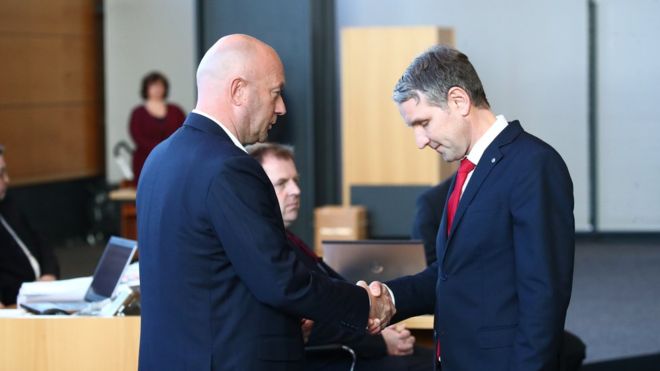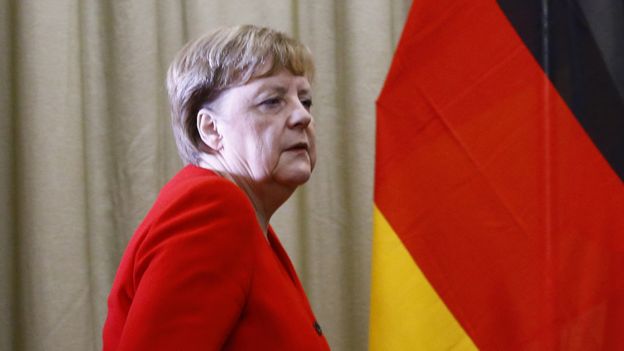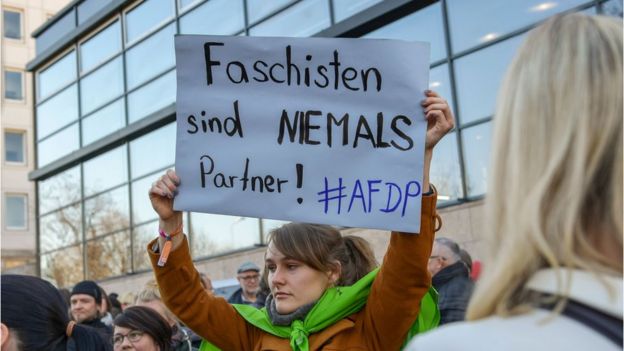Germany AfD: Thuringia PM to quit amid fury over far right
From BBC

A German state premier elected on Wednesday with the help of the far-right AfD has said he will stand down to pave the way for fresh elections. “Resignation is unavoidable,” he said.
The election of liberal leader Thomas Kemmerich in the eastern state of Thuringia prompted national outrage.
Chancellor Angela Merkel called the election “unforgivable” and said it must be reversed.
For years Germany’s main parties have shunned the AfD.
Mr Kemmerich told reporters on Thursday that his liberal FDP party had decided to request the dissolution of the state parliament in Erfurt.
Wednesday’s vote has been described as a political earthquake for Germany.
The AfD has broad support in Thuringia. But the state election in October was won by the far-left Die Linke, whose leader Bodo Ramelow was ousted from power.
Mr Kemmerich beat Mr Ramelow by 45 votes to 44. Besides the support of the AfD, Mr Kemmerich also got votes from local MPs in his own FDP and Mrs Merkel’s Christian Democrat CDU.
However, he insisted there had been no co-operation with the far-right and accused them of carrying out a “perfidious trick to harm democracy”.
‘Bad day for democracy’
Speaking on a visit to South Africa, Chancellor Merkel said the Thuringia vote had to be reversed – implying that the state election would have to be re-run.
“It was a bad day for democracy, a day that broke with the long and proud tradition of the CDU’s values. This is in no way in line with what the CDU thinks, how we have acted throughout our party’s existence,” she said.


Many other politicians had also called for Mr Kemmerich to step down, and for a new election in Thuringia. They included the head of the CDU, Annegret Kramp-Karrenbauer.
The Free Democrats’ (FDP) leader, Christian Lindner, had travelled to the state capital Erfurt on Thursday for talks with Mr Kemmerich ahead of the party’s statement.


Some have compared the AfD’s surprise move to the Nazis’ rise to power and there were protests in several German cities after the election.
In 1930 a Nazi entered the Thuringia government – the party’s first big breakthrough in the Weimar Republic, culminating in Adolf Hitler’s appointment as chancellor in 1933.



- Far right overtakes Merkel party in regional vote
- Germany’s far-right AfD: Victim or victor?
- Just how far to the right is AfD?



The Thuringia AfD is led by Björn Höcke, one of the AfD’s most controversial figures.
He sparked an outcry when he condemned the decision to place the Holocaust memorial in the heart of Berlin, describing it as a “memorial of shame”.
A letter sent by Mr Höcke to Mr Kemmerich on 1 November has gone viral on Twitter, in which the regional AfD leader offered his party’s support – either to form a technocratic government or a minority FDP-led government. It would break the long-standing red-red-green ruling coalition in Thuringia, he said.
The letter, first reported by regional broadcaster MDR at the time, shows that the AfD was seeking a deal long before Wednesday’s political shock.
The anti-immigration and anti-Islam AfD has MPs in all 16 of Germany’s state parliaments.
Nationally the AfD has 89 seats in the lower house of parliament (Bundestag), out of 709 in total, making it the largest opposition party.
Critics of Mr Kemmerich’s election were appalled that the two centre-right parties had apparently made a pact with a party that holds extreme views on immigration, freedom of speech and the press.
His party had barely scraped into the local parliament in Erfurt with just 5% of the vote last October.
In a tweet (in German), the AfD hit back at people who compared them with the Nazi Party.
“These Nazi comparisons, for example one by Peter Frey of @ZDF, really stink. We in the AfD stand FOR a law-based state, democracy, political pluralism and FOR Jewish life in our country. We are AGAINST all violence and censorship of opinion. Stop the incitement!” the tweet said.
Among the tweets comparing the AfD to the Nazis was one from Die Linke’s Bodo Ramelow, who juxtaposed a photo of Hitler becoming chancellor with Wednesday’s photo of Mr Höcke shaking hands with Mr Kemmerich.
The tweet included a quote from Hitler, who said in February 1930: “We achieved the greatest success in Thuringia. Today we really are the crucial party there… The parties in Thuringia, which up until now formed the government, cannot get a majority without our assistance.”




